The Off-Balance Variety Show: October 2025.
Second chances, The Magician and Brandi Carlile.
And here we are! I hope everyone had a great October.
In Off-Balance custom, here is a snapshot of what I watched, listened to, read and (mostly) enjoyed over the past month (that is, what I haven’t covered already).
Thanks for reading!
Until next time,
Ryan.
Movies
TV
Music
What Do We Need From Our Movies Right Now?
,
,
Why Meaningful Work Often Looks Like Failure
,
Killer Klowns From Outer Space (1988)
One night, seemingly unprompted as they descend upon a small California town are extraterrestrials known only as the Klowns.
Beings who, true to their purposely misspelled name, quickly get to work terrorizing the populace with a series of appropriately wacky (and horrifying!) methods of death and destruction.
But banding together to stop them, in a classic love triangle turned allies-of-necessity are Mike (Grant Cramer), Dave (John Allen Nelson) and Debbie (Suzanne Snyder): three locals who realize that though they may be outnumbered, they can’t allow themselves to be outmatched.
It helps to get the obvious out of the way, of course.
Killer Klowns is, well, exactly what is advertised.
A B-movie, quasi-slasher comedy that, since its release - despite the inherent hilarity which just courses through it - has continued to endure in its own niche corner of the Halloween movie market.
Not a genuine franchise starter, nor a big budget effort or even operating in the true, upper echelon of cult efforts… yet the confidence on display here, one way or another, is undeniable.
The brainchild of the Chiodo bothers, while the storytelling may be circus-tent thin (clown humour), Klowns sees their special effect background in full force, combining miniatures, practical stunt work and strong costuming to create their grotesque antagonists with a clear vision. This internal consistency, never wavering tying everything together as it does, managing to sidestep complete absurdity, while being wholly entertaining (always sure to remind viewers that yes, they’re in on the joke).
A film very much of its time, with Klowns, comes expectations moderated, considering but shenanigans, at least, sky-high.1
Rating: 6.0/10
Mr Inbetween (Seasons 1-3) (2018-2021)
While the TV landscape has undeniably shifted over the past twenty, twenty-five odd years, turning the antihero protagonist into well-trodden ground, such familiarity doesn’t necessarily preclude any new iteration on that template from succeeding.
It simply means the resulting execution is doubly important.
So in this vein, while Mr Inbetween can’t entirely escape the preconceived notions it is framed around over its three seasons it brings forward some incredibly effective, if at times somewhat predictable television.
Ray Shoesmith (Scott Ryan) cares little for pretence.
He lives a quiet life as a bouncer in suburban Sydney, simply trying to be good co-parent to his daughter Brittany (Chika Yasumura), keep his scheming buddy Gary (Justin Rosniak) out of trouble and find time for nights out with his girlfriend, paramedic Ally (Brooke Satchwell).
But Ray holds many secrets.
Chief among them that he is a well-respected criminal in the Australian underworld (“The Magician”) taking on everything from debt collecting and robberies to contract killing, while occasionally doling out vigilante justice on those he deems deserving.
And though he toes a careful line, in working to keep his two lives separate, often struggling against the most violent of his impulses, Ray comes to fear that it will be a battle he cannot win.
Credited entirely to the writer-director duo of Ryan and Nash Edgerton, while Mr. Inbetween is technically an adaptation/spin-off of Ryan’s previous effort, the 2005 film The Magician, it holds little resemblance beyond the larger generalities.
Instead, across its 26 episodes, the show is, primarily, a character study. Though not just for its protagonist but equally so, for those around him.
Much of this success then, naturally, lies in the execution.
The editing and cinematography, if understated, deliver while the dialogue, though minimalist, is crisp and punchy with a layer of often humorous cultural flavour that immediately helps to differentiate Mr Inbetween from its similarly-styled (mostly American) contemporaries. The violence too isn’t overdone, content to lean towards the quick and purposeful rather than any sort of full-on action film spectacle. And while the structure and plotting aren’t necessarily breaking any new ground either, a focus more on the people over strict bombast helps to keep the stakes compact.
Alternating between tenser efforts, considering and outings that are more low-key, personal.
Ray, finding himself navigating the challenges brought forth by his line of work, counterbalanced by the trial-by-fire that is his experience in parenthood and more so, the compounding emotional damage he tries to repress, if only for everyone else to pick up the pieces.
To this, the performances, particularly the leads, are all key in seeing the material lands effectively and they deliver.
As Gary, Rosniak nicely fills the comedic relief role but he also gets quite a few moments of heavier material (particularly in the second season) and he sees that these competing elements land to effect. Gary and Ray’s history isn’t elaborated on much, left mostly to implication but their status as the other’s ride-or-die, no matter what, is communicated very well.
Similarly, so is the contrast between Matt Nable’s Dave and Damon Herriman’s Freddy, two members of Ray’s criminal circle for which morality is a shifting scale.
Chika Yasumura, comparatively, doesn’t have much material from the jump. Alongside Nicholas Cassim as Ray’s brother, she mostly serves to act as a window into the titular hitman’s personal life. But Yasumura brings a great deal of energy to her portrayal, observant and personable, Brittany, serving away from the lesser archetype that can define younger characters in such scripted dramas.
Her arc, specifically in the final stretch of episodes, building soundly and with weight.
Satchwell’s Ally, meanwhile, is more fleshed out from the jump, finding a kindred spirit within Ray, even as he mostly keeps her in the dark regarding the true nature of his lifestyle. Satchwell, regardless, making her character feel genuine and deeply human.
Ultimately however, everything orbits around Ryan’s Ray.
Generally indifferent to the violence he inflicts and expressing the belief, more than once, that it is necessary to maintain the ecosystem in which he lives in, on the surface, again, there isn’t anything groundbreaking within this presentation. The rough anti-hero type who, despite being scarred by his past, works hard to push that trauma-acknowledgment to the side. Ray is a good friend and father, if a generally “so it goes” criminal, who follows a strict code of honour that separates him from most he deals with, even to his detriment.
Though Ryan - as creator, lone credited writer and overall creative force - brings him to life so throughly and with such commitment, one is brought in, sometimes, despite themselves.
This, all the more impressive considering that The Magician and Mr Inbetween are, thus far, the only projects Ryan has been involved with in his career: though not once does he feel overmatched or outgunned, even when up against far more seasoned performers, instead quietly bringing his character’s many contradictory elements to life.
No, Mr Inbetween isn’t totally airtight, unable to totally avoid the predictability that comes with its chosen territory or the odd misstep in its overall delivery.
But it is a crime-drama of great strength either way, while being held up with memorable supports, from its performers on down.
Overall rating: 8.4/10
Dexter: Resurrection (Season 1) (2025)
Though broadly an adaption of Jeff Lindsay’s long-running novel series, on screen, Dexter has always, for better or worse, marched to the beat of its own slightly-disturbed drum.
But after the closing seasons of the original series visibly faltered, capped off with a 2013 finale all but universally despised (including by star Michael C. Hall) it spoke to a disappointing, dispiriting end.
A downturn for which recovery, for most, is all but a pipe dream.
Instead, with OG showrunner Clyde Phillips returning to the fold came the 2021 sequel miniseries New Blood alongside short-lived prequel effort, Original Sin.
Both, in their own way, proving there was more story to tell for Miami Metro’s most notorious boogeyman but equally, if never explicitly saying so, working overtime to redeem what was once considered all but unsalvageable.
And so then arrived the aptly-named, ten-episode Dexter: Resurrection earlier this year.
Another sequel series, yes, picking up what New Blood put down but perhaps, most importantly, proving with a renewed zeal that one of television’s most conflicted anti-heroes isn’t done just yet.
After the events in Iron Lake, Harrison (Jack Alcott) has disappeared into New York City, quietly working as a bellhop at a Midtown hotel, if being continually haunted by his various demons.
Meanwhile, awakening from an extended coma following his… father-son bonding exercise, Dexter (Michael C. Hall) is confronted by his old friend from Miami, Angel Batista (David Zayas): who has confirmed, at last, that Dexter is indeed the notorious Bay Harbor Butcher and is now determined to expose him.
Though as he arrives in New York, reuniting with Harrison while looking to stay two steps ahead of both Batista and relentless NYPD detective Wallace (Kadia Saraf), Dexter soon becomes entangled with the mysterious Leon Prater (Peter Dinklage). Prater, a billionaire who sponsors serial killers in the city and for whom Dexter, in more than one way, is a noted person-of-interest.
Parenthood, his past, managing the urges of his “Dark Passenger”: as he moves through the boroughs, Dexter soon realizes that the only way to keep Harrison and the city safe is to do what he does best.
After all, he may be a killer… but he follows a code.
Again, on the surface, it can seem that Resurrection, so indebted to what preceded it - with flashbacks, deep cuts, high-profile cameos and thematic familiarity - alongside the bevy of new plot elements introduced would promptly see itself buckle under that weight, trying too hard to recapture the glory days of the earliest Dexter seasons, now, almost twenty years ago.
Instead, it plays, impressively, with tact admission.
The franchise, its protagonist, the cultural space in which they all operate, much has changed in those intervening years and ignoring that passage of time, well, it wouldn’t serve anyone nor the story the team is looking to tell.
And while not every major branch and subplot lands, this is something reflected in the larger character/performance work.
While having Dexter cross paths with other serial killers, socially, has been seen before Resurrection not only gets a fair amount of milage of the context in which they’re brought together but in how those dynamics inform the story. Specifically, that between Hall and Krysten Ritter’s Mia. Uneasy kinship, paired with a drive to secure an all-important upper hand, considering the dangers in their shared “line of work”.
Ritter, bringing a sharp energy to her character that sees her elevated amongst that particular ensemble.
Zayas, meanwhile, steps back into his role as Batista with purpose, after what was a glorified cameo appearance in New Blood. His former friendship with Dexter, clashing against a growing obsession to see him brought to justice, to avenge the loved ones for whose deaths he holds him responsible. Though his arc does struggle with a sense of inconsistent and incomplete pacing, Zayas does well here, making Batista sympathetic, even when fitted, considering, as an antagonist.
Similarly, Kadia Saraf delivers as Detective Wallace.
While one of Dexter’s more enjoyable crutches is seeing him run circles around the police, as New Blood highlighted, when their only recourse is plot necessity, it simply doesn’t land as effectively as it could.
Clearly learning from this, Resurrection leans back into what clicked in the original series, Wallace, as someone who neither Harrison or Dexter can so easily outfox, Saraf’s hyper-focused, all-business portrayal creating a character who brings noticeable tension, given this, each time she appears.
Elsewhere, as Blessing, Dexter’s unassuming landlord, Ntare Mwine has a good contrast with Hall as does Emily Kimball with Jack Alcott as Gigi, Harrison’s early-stages love interest, despite her comparatively limited screen time.
In reprising her role as Deb in New Blood, Jennifer Carpenter (and quite well too) played up a far different energy as Dexter’s inner voice, though in returning as Harry, James Remar recaptures his and Hall’s established back-and-forth without skipping a beat, the imagined angel on the devil’s shoulder (this, even if the show does stretch his work somewhat).
As the two most visible antagonists however, neither Peter Dinklage as Prater nor Uma Thurman as his right-hand are, not necessarily weak links but rather, plainly unremarkable. The spooling out of their backgrounds and motivations as designed is no doubt purposeful, to create a growing sense of intrigue episode-over-episode but instead, it feels half-baked.
Arcs, incrementally and wastefully expanded, to everyone’s deterrent.
Conversely, as Harrison, Jack Alcott stands out.
And that is not to say he didn’t in New Blood but by design there, Harrison was clearly meant to act as a window of reflection into his father’s psyche instead of being a character more individually rooted.
That is still the case to an extent but in firmly establishing him as a co-lead, Alcott is given more material, which he runs with.
Like Dexter, though Harrison may have been “born in blood” and struggles with his darker intentions, he also has a far more visible humanity that his father lacks: if respecting that he can’t change who Dexter is, he wants, desperately, to be more than finely-honed killer, however easy that urge may come.
Some of his secondary plotting can feel extraneous in terms of pure storytelling momentum - as Harrison fights day-over-day for both his present and future - but as it relates to his larger arc, it is all communicated well.
A young man who has known little but tragedy, insistent that wherever he goes next, it will be on his terms alone.
Less a mask, more raw honesty.
Alcott, making Harrison someone the viewer just wants to root for, either through his chemistry with his co-stars (Hall, specifically) or within the characterization he further refines.
But the cold beating heart of Resurrection, it is, of course, inescapable: Michael C. Hall as Dexter.
What is maybe the most impressive, regarding Hall and his performance however, is in the way he continues to bring each element of Dexter’s ever-contradictory if ever-evolving character to life.
In essence, forever building upon the decision that was made at the conclusion of that very first Dexter season: the titular anti-hero, deciding, almost on a whim, to be more than an emotionless machine bound only by strict adherence to his “code”.
And though Dexter is still, well, what he is, his recent experiences in have affected him in more ways than one.
No longer just a classical psychopath, stripped to the bone.
His complex but undisputed love for Harrison, his confrontations with Batista, each, forcing him to admit head on, for the first time in years, that he isn’t entirely squared away behind a performative façade. Humanity, always something he has tried to keep at an arm’s length but be it more proactively relying on his vigilante instincts before stepping into the kill room or the acceptance of his changing social and physical norms.
Older and battered by injury, though he is still an unstoppable force of nature, relatively, the beats Resurrection does take in showing that Dexter is not operating at his peak are a rare instance of such a revival effort not shrinking away from the change that has brought it forward in the first place.
Dexter, working himself back into fighting shape though not just to satisfy his inner chaos but to protect those around him too.
Hall, still, expertly, walking the tightrope between making Dexter totally unnerving - his understated delivery, the nigh empty eyes, the white-hot rage, burning just below the surface - while equally, commanding the screen at every opportunity. Dexter finding his purpose not in senseless acts of violence but rather, in something that neither those he hunts nor those that pursue him could ever totally understand.
Justice, in its most dangerous form.
Resurrection isn’t without missteps.
Technically passable at best, with drab set design and costuming, or an over-reliance on bought-for musical cues. There being no active effort, artistically, to try and contrast sunny Florida with a more oppressive, gloomier New York City (to be fair, New Blood didn’t do this either) with a handful of dead-end subplots and forgettable main villains.
House-style presentation, without actionable memorability.
But on the reverse, the cast is great, the bigger picture swings in the storytelling are well done and as a do-over to a do-over, at last, Resurrection is the epilogue/second act that the character deserves.
Already renewed for a second season, there is a measure of understanding that, with the franchise’s history in mind, it is being judged on a curve of sorts.
Not reaching the level of the original show’s highs (an impossible bar, frankly) but in putting Dexter back where he belongs, succeeding.
Rating: 8.5/10
The Rainmaker (Season 1) (2025)
After up-and-coming law student Rudy Baylor (Milo Callaghan) finds himself on the outs of prestigious firm Tinley Britt, he falls in with Bruiser (Lana Parrilla) and Deck (P. J. Byrne): two small-time attorneys caught up in a wrongful death claim against a Tinley client.
Initially indifferent, Rudy soon realizes there is a bigger game at play, particularly one that Tinley partner Leo Drummond (John Slattery) and new associate, Rudy’s ex-girlfriend, Sarah (Madison Iseman) are determined to bury.
But when serial killer Melvin Pritcher (Dan Folger) emerges as a dangerous x-factor, Rudy and his partners must move quickly, before their time runs out.
The second adaption of John Grisham’s same-named novel (following the 1997, Matt Damon-led film), while the general set-up is the same, big picture-wise, The Rainmaker very much operates in its own space.
Though ultimately, it is the back-of-the-box hook to a tee: a functionally well made, crime-drama-legal thriller with all the expected garnish. That doesn’t mean it is wholly absent any serious momentum but over its ten-episode first season, which concluded earlier this month, The Rainmaker can often struggle in defining just what it wishes to be, in which one of those pillars it should veer most strongly towards.
At times predictable and often heavy-handed with the lack of tact in its storytelling (this, particularly so in the one major, mid-season subplot regarding a domestic violence case) the show avoids the worst of its potential fate, as a totally by-the-numbers effort, primarily through the work of its cast.
Parrilla and Byrne bring great energy, both together and individually while Callaghan and Slattery neatly fill their protagonist-antagonist roles in deeply familiar if enjoyable enough ways: the brash young gun, up against the smarmy boardroom charmer.
And that, perhaps, is The Rainmaker most succinctly: not strong enough to truly rise above the weakest of its parts but not completely forgettable either.
Rating: 6.3/10
Trainwreck: Mayor of Mayhem (2025)
Even a decade-plus on, the Rob Ford saga remains, still, a truly bizarre episode in Canadian politics.
Ford, the brash Toronto mayor who gained international infamy after being caught on tape smoking crack cocaine in 2013, only the most visible incident in a career dominated by a poor decision making and baffling public candour prior to his death three years later.
Trainwreck: Mayor of Mayhem then, the special that released earlier this year (apart of Netflix’s so-named Trainwreck series) seems eager to take on the task of telling Ford’s story but at a brisk 45 minutes, it doesn’t give itself any room to breathe.
Crammed full of interviews with journalists, former associates and back-patting types, it plays as little more than a greatest hits package without any sort of leeway for legitimate reflection or more critical examination. A few brief mentions are given to how Ford’s style of political navigation, was in hindsight, something of a precursor to the current US landscape, in addition to the influence of his family (his bother, Doug, is currently the Premier of Ontario) but otherwise, there simply isn’t much here.
If one was there in the moment, Mayor of Mayhem doesn’t encourage much revisiting while if they’re curious to hear more, by-and-large, there are far better avenues in which to do so.
Rating: 5.0/10
A.K.A Charlie Sheen (2025)
There is always something to be said for giving one the space, if nothing else, to speak their current truth.
Of course, Charlie Sheen is definitely something of a unique case in that respect. Having been in the public eye for virtually all of his adult life, there is little of the actor that has been left unsaid (on his own account) or unseen: the professional highs contrasted with his turbulent personal life, punctuated by a decades-long struggle with substance abuse.
Now sober however, with A.K.A Charlie Sheen, the two-part documentary that debuted last month, Sheen again takes centre stage, in a series of interviews alongside various others inside and (partially) outside of his orbit, to break down his journey and career with a renewed perspective.
Though released in tandem next to Sheen’s new memoir, as with any piece of celebrity spotlight work, it arrives at something of a viewer-by-viewer intersection of morbid curiosity and human interest. How the chosen questions are asked and framed, how Sheen presents himself, how much, sympathy, if any, is cultivated for a lifetime of decisions, if through struggle, ultimately cushioned with resources well beyond the reach of the majority viewer.
To his credit at least, Sheen is pretty transparent.
He speaks frankly on the most graphic of his experiences, particularly regarding the heaviest of his drug use, some known publicly, some not, with a candour that alternates between total bewilderment at his past behaviour, acceptance and some measure of quiet regret, specifically on the impact it had on his family (though featured prominently in archival and home video footage, a disclaimer early on reveals that both his father, Martin and brother, Emilio Estevez, declined to participate).
To this however, Sheen’s second ex-wife, Denise Richards, is perhaps the most engaging participant, if only for acknowledging, with a noticeable openness, the challenges she faced in working to navigate Sheen and his/their children’s safety at the loudest levels of his addiction (during the early 2010s), even long after they were separated.
Ultimately though, A.K.A Charlie Sheen lands on a weird place on the axis.
The reality of having Sheen himself dictate the proceedings means, for better or worse, alongside his interviewers, that the material, bombast or not, is still kept at an arm’s length. It is notable that, in one instance, Richards demands they keep filming once she begins to break in a tough emotional spot: the effort to rehabilitate its titular star? Even if not explicitly stated, it is there and inescapable.
It is a project that can be informative considering but completely absent any legitimate staying power, it struggles to be truly worth its weight.
Rating: 6.2/10
Victoria Beckham (2025)
Following 2023’s Beckham, with the aptly-named Victoria Beckham, David and Victoria Beckham have again renewed their partnership with Netflix, this time, in a three part series that puts Victoria in the spotlight: reflecting on both her life and career while simultaneously prepping her team (of her self-titled, Victoria Beckham brand) for their show at Paris Fashion Week.
The catch naturally, is understanding that the only way to get anything out of Victoria Beckham is to take it at face value. So slickly produced, so tightly packaged, so born as it is out of the millionaire-twice-over distribution racket, as a solid if somewhat unspectacular piece of celebrity promo work.
Inherently, this isn’t a project designed to strip away at carefully crafted images, to unearth hidden secrets or long suspected… and anything that could fit that bill, well, that’s what Beckham was for.
But primarily anchored by Victoria, as she traces her journey from childhood, to the Spice Girls, to Paris, Victoria Beckham is, if simple, impressively honest. And although entirely coincidental, it acts then as something of a counterweight to say, A.K.A Charlie Sheen, in not trying to be more than it is.
And hey, that counts for something.
Rating: 6.6/10
3 Feet High and Rising (De La Soul) (1989)
Emerging from the East Coast, New York scene that would immediately and forever alter the course of hip hop in the late 1980s/early 1990s, 3 Feet and Rising is one of those albums that seems almost impossible to believe as is, even thirty-six years later.
De La Soul’s debut effort, as compact and rich lyrically as it is production-wise, trading the high-level intensity that, to that point, had defined the genre for a feel-good, more off-beat approach. Heavy jazz-soul sampling bound to on-the-ground, person-to-person storytelling: this, a full year before fellow New York area natives, A Tribe Called Quest, would break out doing something similar (fittingly however, as many members of the Native Tongues supergroup appear here, including Q-Tip).
Long shut out from streaming services due to clearance issues regarding the group’s extensive sampling, despite only being reasserted in 2023, 3 Feet High and Rising still feels fresh, present.
Itself a testament to the quality that was always there.
Returning to Myself (Brandi Carlile) (2025)
With Returning to Myself, her eighth album which released earlier this month, Brandi Carlile has once again proven herself as one of the few currently working artists that can truly lay claim to the much vaunted, singer-songwriter title in a way that feels genuine.
Sure, like anyone she has her list of collaborators and fellow producers, helping to further hone her musical message but not once here does that process show its seams, guided by committee with mass-market profit in mind.
Instead, it is Carlile at her strongest: personal, introspective, drawing on a sense of lived-in experience that informs every line, each moment of hard-won delivery, with an album that will easily sit alongside the rest of her catalogue.
Substack Spotlight
There are many wonderful writers, out there in the wild but specifically so, here on Substack.
In that spirit, here are a few articles I really enjoyed this past month, including some from valued members of the Off-Balance community.
Do feel free, if you haven’t already, to expand your horizons and check out what they have on offer.
What Do We Need From Our Movies Right Now?
,
As one of the leading members of Substack’s film effort, Taylor has always had her finger on the both the pulse of that community but as well, the medium itself.
How it has grown and evolved, yet equally so, backpedaled.
The broad structure of, specifically, American filmmaking finding itself in creative lockstep or as she puts it, the loss of collective, lived-in artistic discovery: the instinct to follow the familiar, instead of the empowerment that can come with risk, wherever it leads.
It isn’t something that can be solved overnight, no. An immediate balm applied to sooth those long-cresting tides but as Taylor speaks too, it is not the numbers or algorithms that matter most but the people: the currently batting and on those deck who will take film forward, a truly collaborative approach, prioritizing the exciting unknown over comfortability.
You can find Taylor at .
The Dark Sea of Creativity
,
Perhaps the most striking thing about Lisa’s writing, as always, is how brilliantly she blends all of her approaches into one: the personal and professional experience, lining up next to a person-to-person angle that is deeply human, honest. Relatable.
The measure of any creative, after all, is within the balancing act they must constantly perform, even when not operating in the physical space of bringing their voice into the world.
The ground, shifting, expectations, changing on a whim. The importance of mentorship and belief, on all sides when self-doubt can seem inescapable.
But Lisa, with a cool and steady hand, reinforces the best of possibility both within what is and more so, what could be.
The destination may be unique but the journey, it is not one that needs to be taken alone.
You can find her at .
Why Meaningful Work Often Looks Like Failure
,
Success - such a catch-all term as it is - can mean vastly different things to every person in any artistic-creative space but particularly so, to writers: at such a time, more so than ever before, where uncertainty has become a dominant overhang.
So then however, with this piece, Ashley speaks to her personal experience with this phenomenon, if highlighting too, the insight of her own community: from navigating failure and painful acceptance, to putting down a stepping stone while finding meaning in the smaller victories.
A paragraph, a single sentence, a particularly inspired turn of phrase: all left to marinate in the journal pages long before they’re brought to light.
For one never knows from where inspiration may strike.
You can find Ashley at .
Back in the spring, the always great
wrote about Klowns and the film’s seemingly resurgent grip on the cultural space: including continued efforts by its creators to extend their particular brand of seasonal chaos into streaming-centric franchising - you gotta love it (and you can read Jeremy’s piece here).


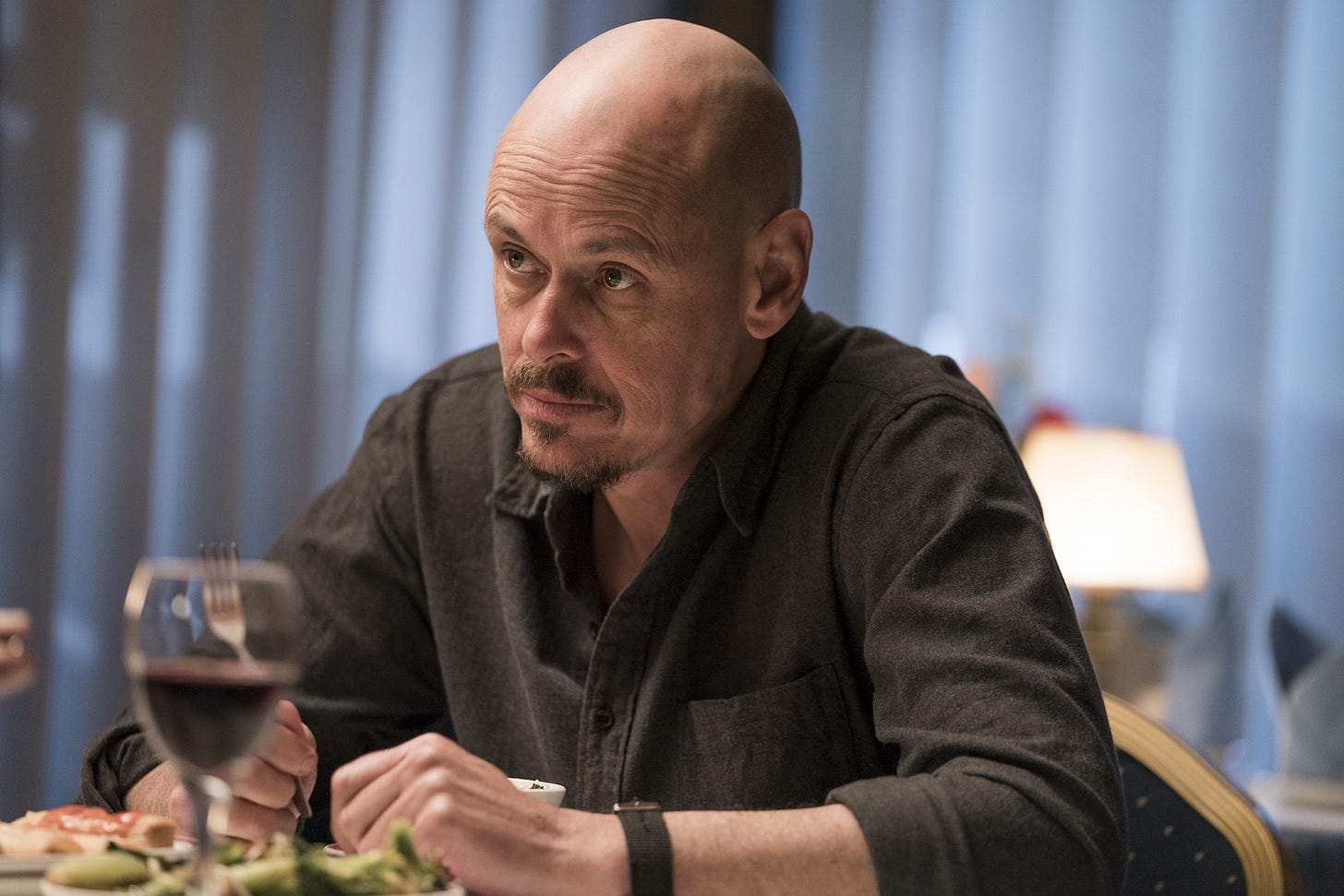
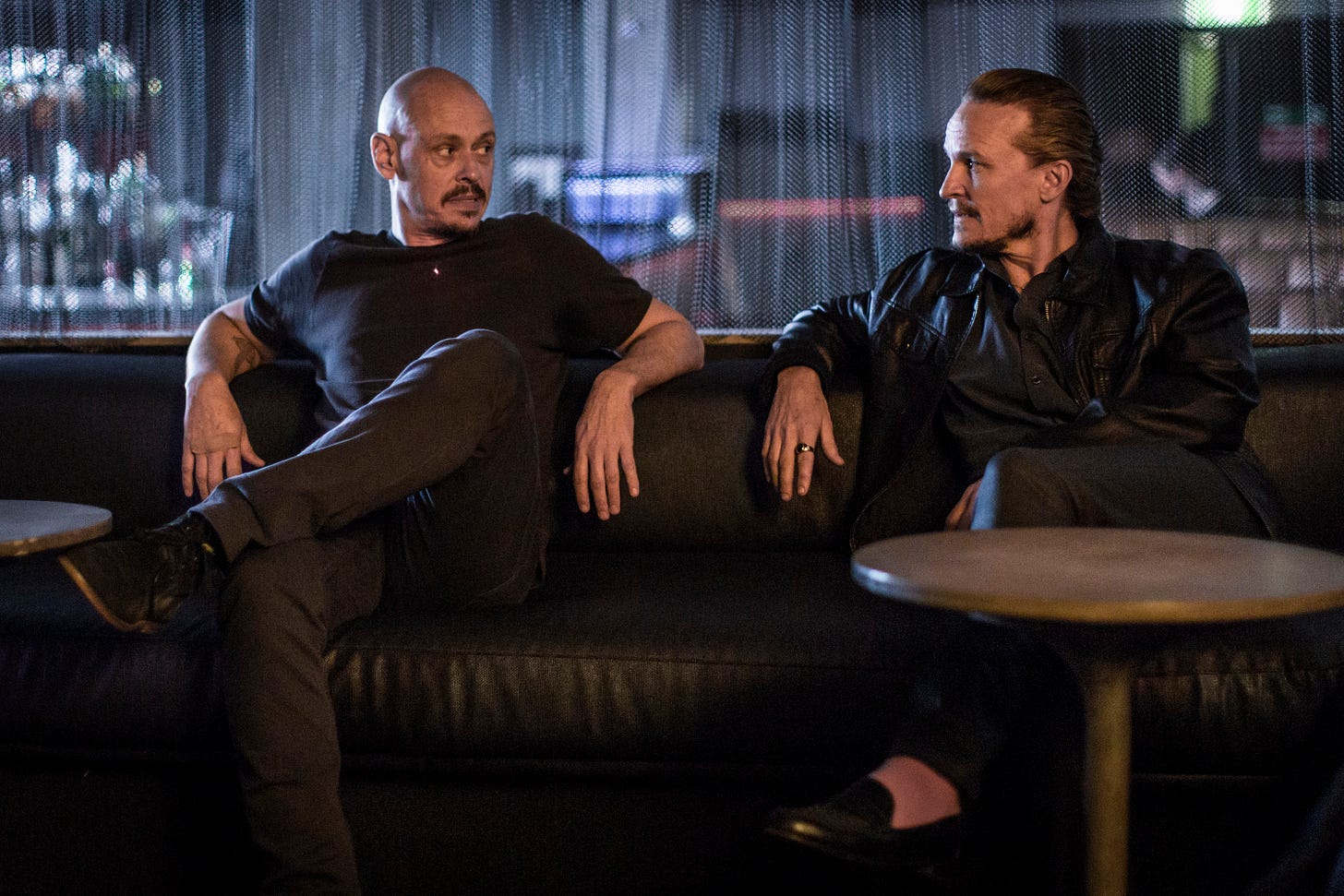
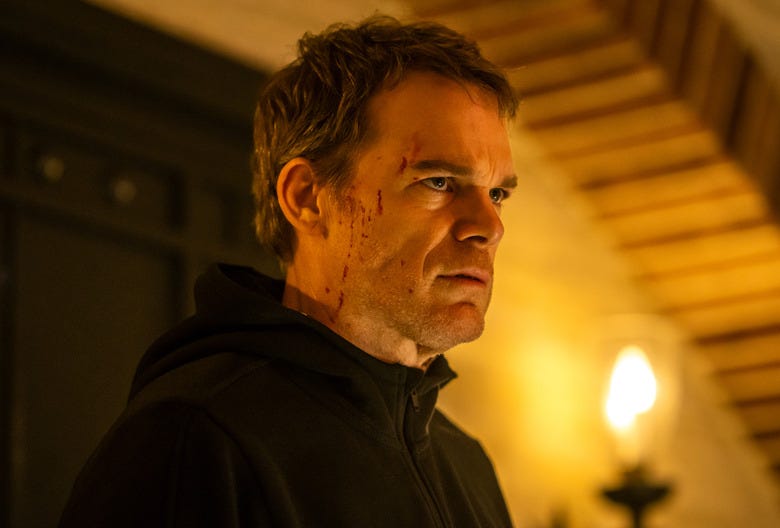
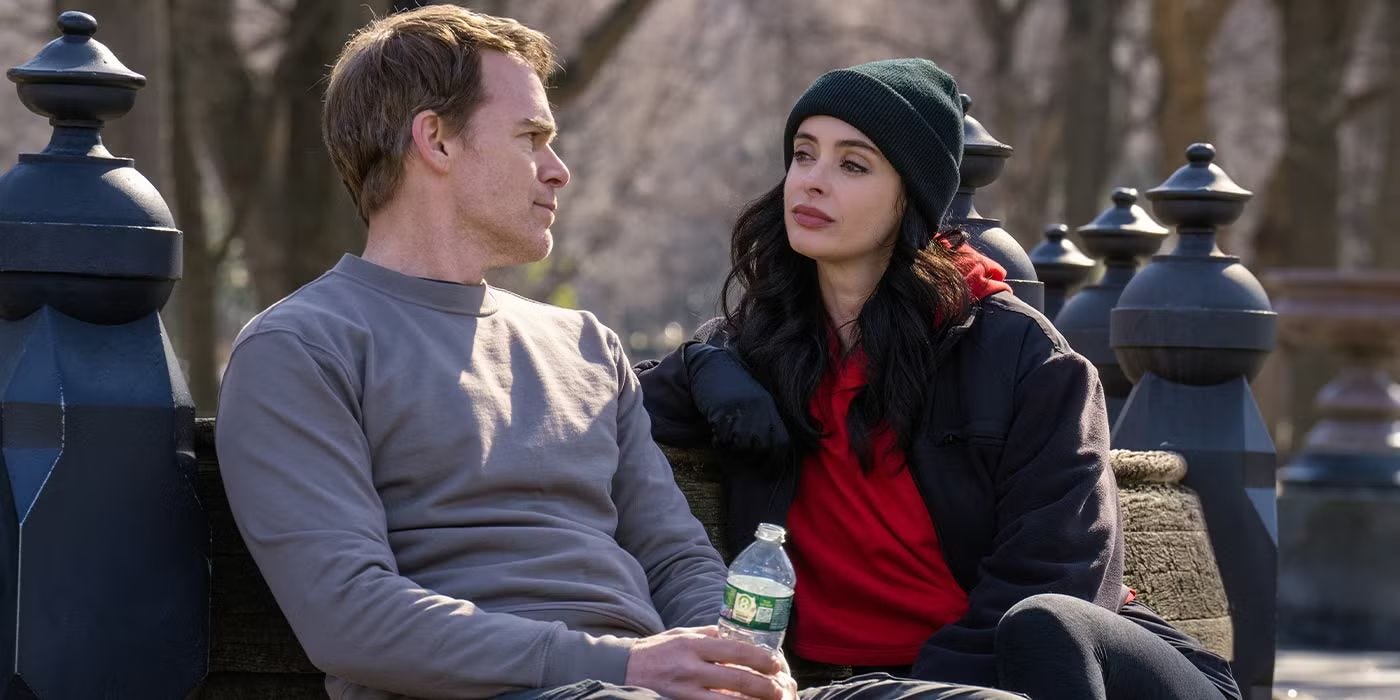
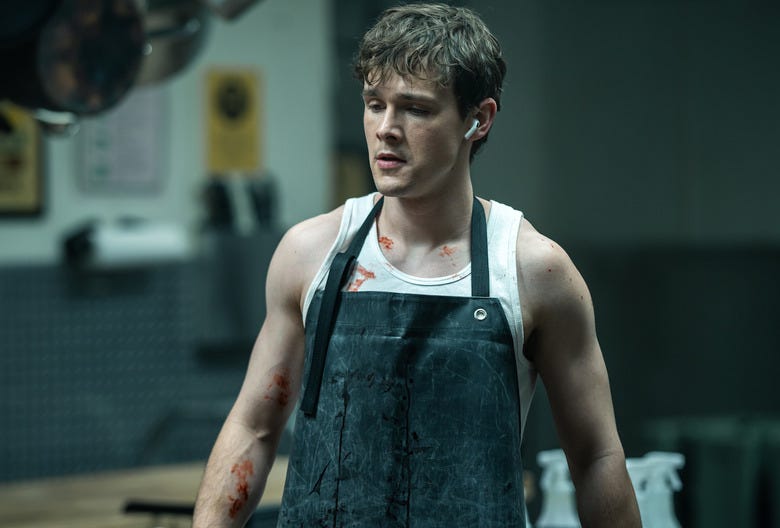
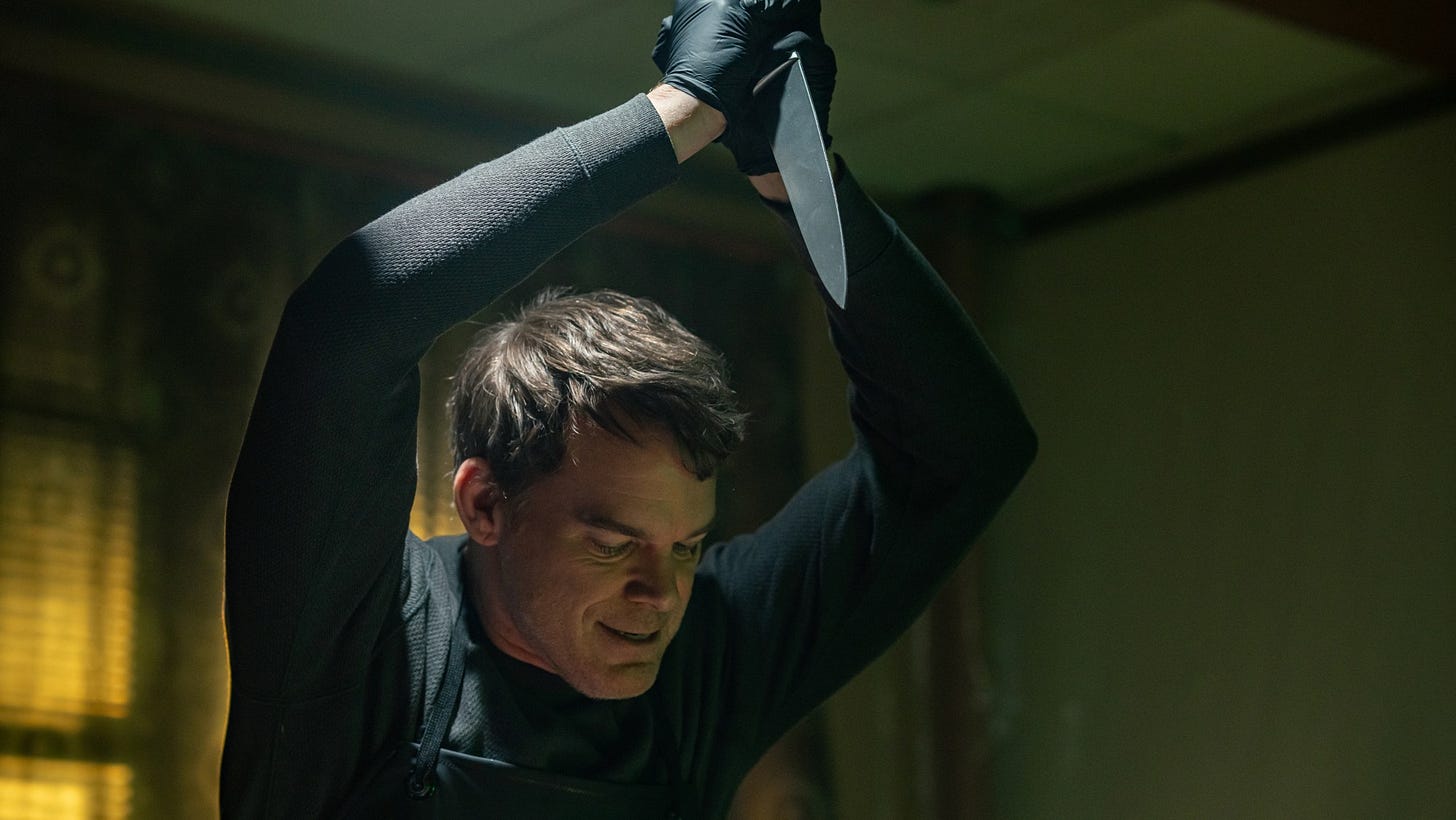
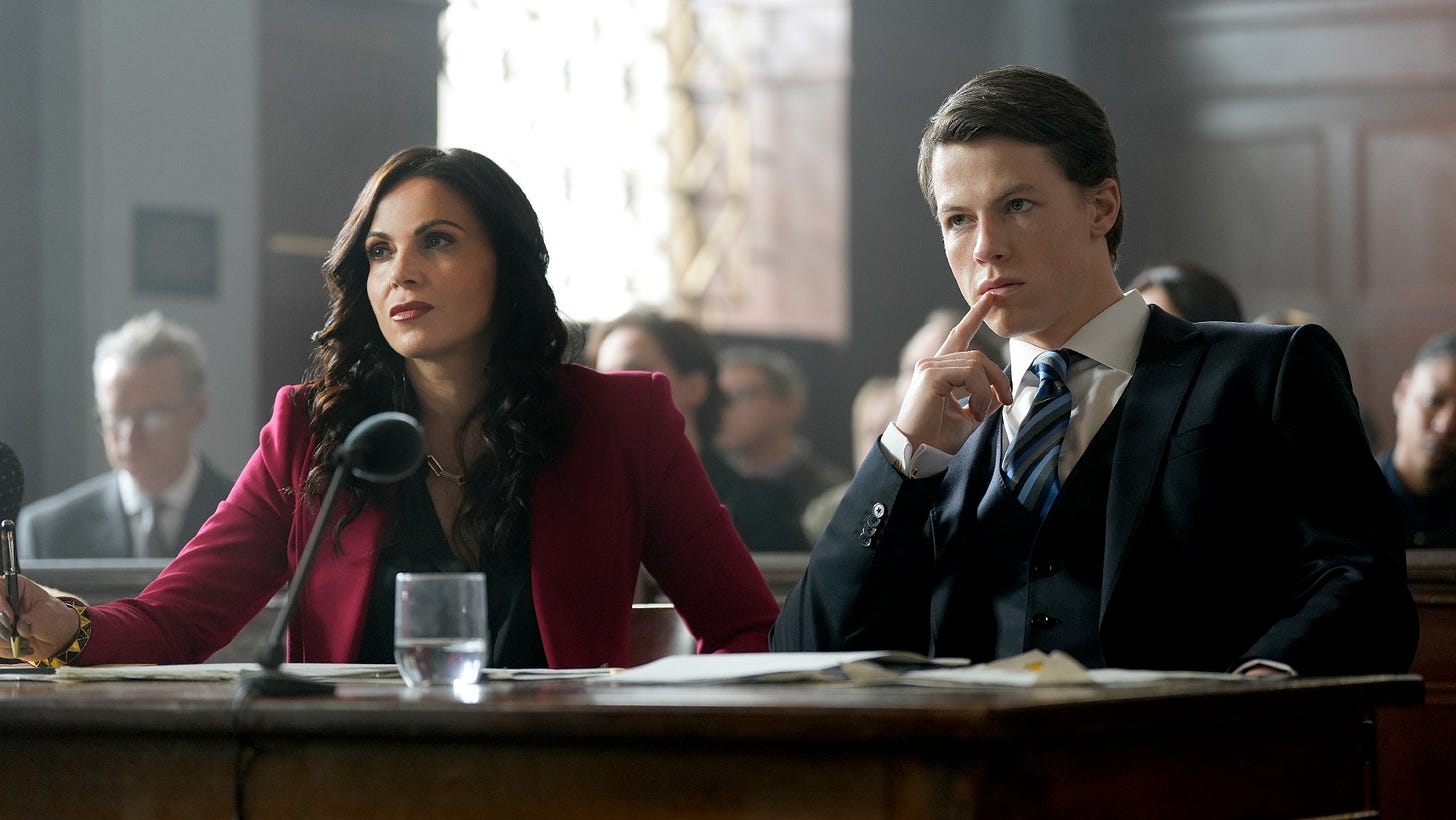



Always such a pleasure to read your reviews, Ryan. I'm looking forward to checking out Dexter once more. I really love the premise of that narrative. And of course De La Soul is a classic and worth a revisit. Thank you so much for including my essay, it was a beast to write and often felt as though I was trying to bridge a very wide gap. Glad to know it landed with you.